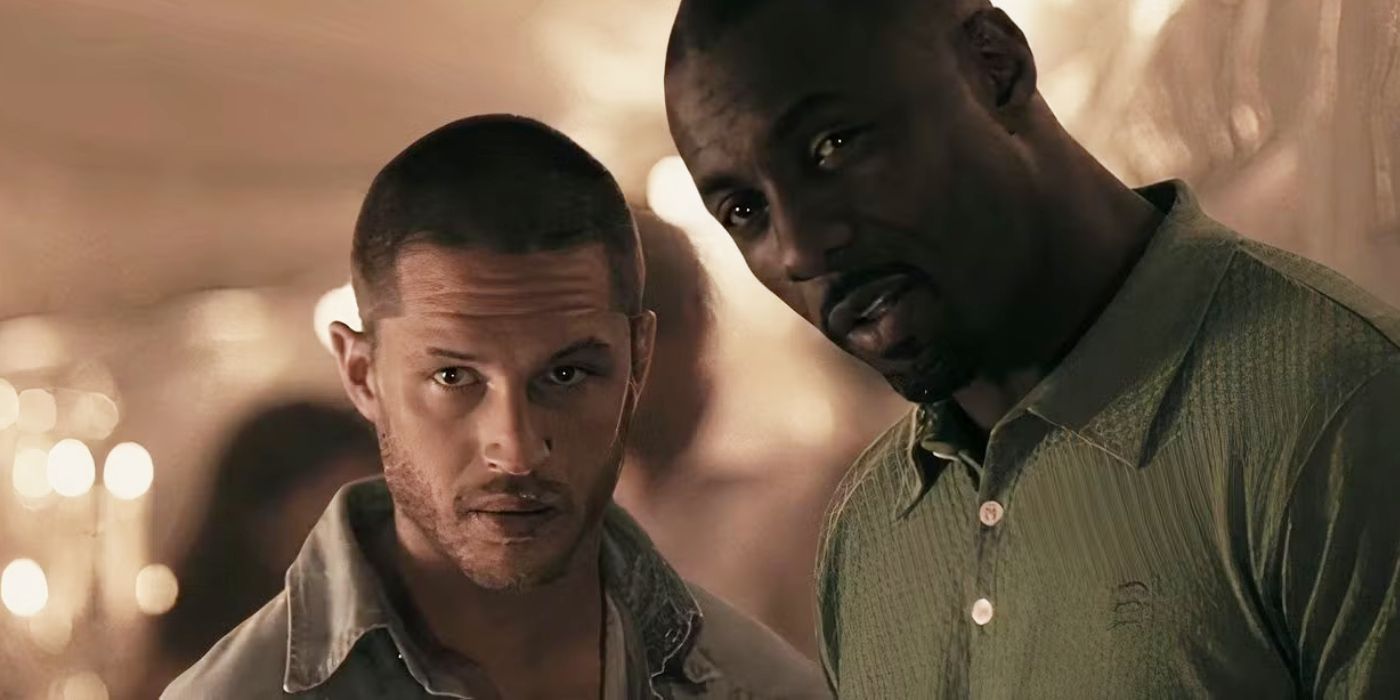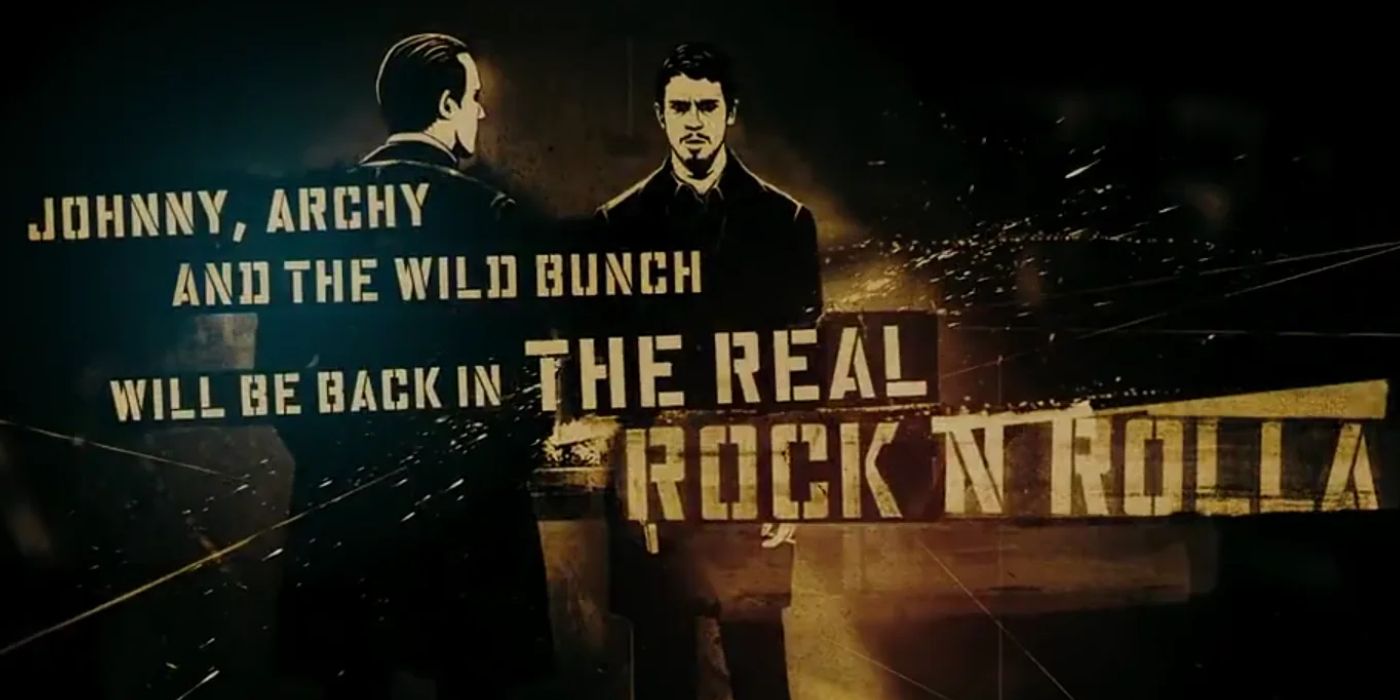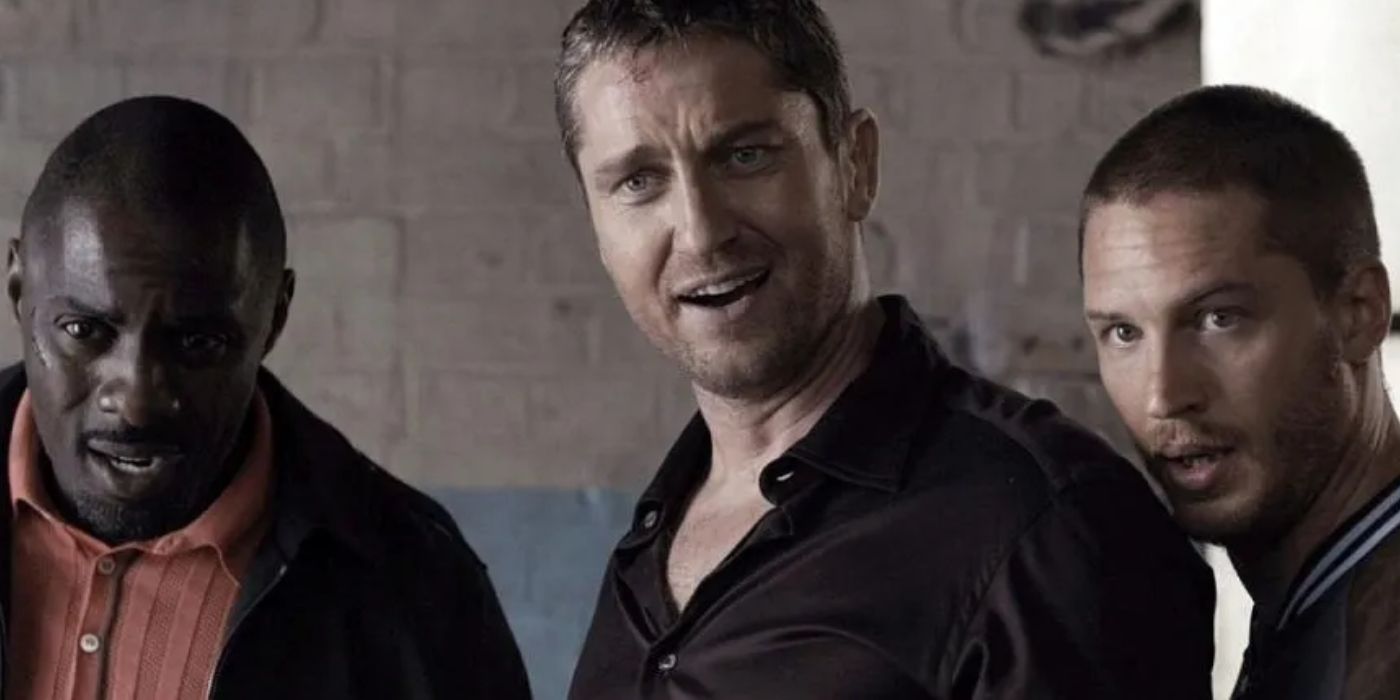Even if some of their most recent films are giant blockbusters like Mad Max: Fury Road and the live-action Aladdin, actor Tom Hardy and filmmaker Guy Ritchie started in Britain’s relatively smaller crime genre. Moreover, they’re practically synonymous with the country’s gangster films. In fact, they teamed up for the 2025 series MobLand. Even better, MobLand was such a hit that it was renewed for a new season just this year.
That said, MobLand is not the first time that Hardy and Ritchie have teamed up in Britain’s (cinematic) ganglands. That honor goes to RocknRolla, Ritchie’s fourth crime film and his last one for at least a decade. When it first hit cinemas in 2008, RocknRolla bombed at the box office and only received lukewarm reviews. But now, 17 years later, RocknRolla is seen as one of Ritchie’s most underrated and misunderstood works.
Tom Hardy Portrays a Hilarious & Surprisingly Progressive Gangster in RocknRolla

In RocknRolla, Hardy is Handsome Bob: a member of the so-called Wild Bunch, and the group’s designated driver. Additionally, Hardy isn’t the only high-profile actor to star in RocknRolla. Hardy is joined by Gerard Butler and Idris Elba, who portray the Wild Bunch’s leader, One-Two, and Mumbles (One-Two’s right hand), respectively. The film’s impressive cast also includes Mark Strong, Tom Wilkinson, Thandie Newton, Ludacris, Jeremi Piven, and Toby Kebbell, all portraying different kinds of gangland archetypes.
At first glance, Handsome Bob and company are the exact kinds of characters that fans of Ritchie’s crime films know and love. They all have cool monikers, their reputations precede them, their dialogue comprises Ritchie’s signature snarky banter, and so forth. However, they all sport a sense of nuance, maturity and humanity not seen in Ritchie’s most famous gangland yarns, Lock, Stock & Two Smoking Barrels and Snatch. More importantly, they all subvert their typecast and the crime genre in one way or another.
Take Handsome Bob, for example. As it turns out, he’s gay and in love with One-Two. More often than not, crime films would mock such a revelation to perpetuate the genre’s inherent toxic masculinity. But in RocknRolla, Handsome Bob is treated with the utmost respect. His sexual orientation doesn’t affect his importance to The Wild Bunch in any way, and his friends openly accept him. One-Two’s overreaction to Handsome Bob coming out is offensive, but he quickly apologizes for his outburst and eventually gets over himself.
Hardy doesn’t portray Handsome Bob as a joke, because Ritchie didn’t write a caricature. Handsome Bob is just as tough, capable and smart-mouthed as Ritchie’s other gangsters. He makes some jokes and is even the butt of some, but he’s never a walking punchline. Given how male-coded crime fiction is and how the 2000s weren’t exactly respectful towards gay people, a character like Handsome Bob is surprisingly progressive and even timeless now. The same can actually be said about RocknRolla, which is more subversive than most people realize.
RocknRolla Is Not What Fans of Guy Ritchie Expected or Wanted
Then and now, Ritchie is known for writing and directing crime films that are filled with eccentric criminals, rapid-fire dialogue, darkly humorous bursts of violence, and so forth. Lock, Stock, & Two Smoking Barrels and Snatch have had such a profound effect on Ritchie’s career that, even to this day, fans expect his next original film to be a return to this form. This, despite the fact that Ritchie has clearly outgrown this kind of fun but admittedly juvenile style. It’s not that Ritchie left the crime genre but, rather, his take on it clearly matured.
Nowhere is this clearer than in RocknRolla. Instead of celebrating the prime of the gangster’s lifestyle the way that Lock, Stock, & Two Smoking Barrels and Snatch do, RocknRolla acts as an epilogue for London’s underworld. The gangsters feel their age, and some even comment about how tired they are of it all. The city in which they roamed and ruled before is also changing faster than they want it to. London’s dominant criminals are no longer petty offenders and kingpins, but white-collar criminals who can buy the entire city if they want to.
Moreover, RocknRolla underscores how Ritchie’s signature criminals are relics who are out of their depth in an increasingly modernized world. The Wild Bunch, who would be the hip and cool stars of an earlier Ritchie film, are just a nuisance to Lenny Cole and the Russian oligarch Uri Omovich. Even Lenny is an old-school gangster who tries and fails to adapt to white collar crime. As its title makes clear, RocknRolla’s criminals are fading rock stars, and they know it. It’s a question of whether they adapt, sell-out, or stubbornly cling to the old ways and die out.
RocknRolla isn’t as navel-gazing and bleak as Revolver and Wrath of Man, respectively, but it’s part of Ritchie’s mature meditation on the genre that put him on the map. Through his later crime films, Ritchie examines how pulpy criminal characters would cope with getting older, if not wiser, and with being left behind by time. RocknRolla has its share of action and comedy, but it’s more restrained and character-centric than some fans wanted. This is why it failed in 2008, and convinced Ritchie to leave the crime genre for the next 11 years.
RocknRolla’s Failure in 2008 Killed Its Planned Trilogy

RocknRolla bombed at the box office and received very tepid responses, both from critics and general audiences alike. The clearest reason for the film’s failure is that Ritchie’s fans were hoping that RocknRolla would be a return to the likes of Lock, Stock & Two Smoking Barrels and Snatch. Instead, RocknRolla took things a bit more seriously. Worse, RocknRolla is the second of Ritchie’s two high-profile bombs in the 2000s that put his crime films on hiatus for nearly a decade. The first bomb is Revolver.
Revolver’s even worse reception unfairly overshadowed RocknRolla’s first impressions before it hit cinemas. Furthermore, audiences started to move on from crime films and similar thrillers as the 2010s came in. It was around this time that audiences gravitated towards one of the biggest blockbuster streaks in history, as exemplified by the dominance of nostalgic franchises and superhero films. RocknRolla would’ve done exceptionally well in the ’90s, but it predictably struggled in 2008. By no fault of its own, RocknRolla didn’t stand a chance in 2008.
It should be noted that audiences didn’t hate RocknRolla. Rather, they were baffled and underwhelmed by how unconventional and subdued RocknRolla is by Ritchie’s standards. Some even dismissed RocknRolla as Ritchie’s retreat into his comfort zone, even if this claim is the farthest thing from the truth. It wouldn’t be surprising if the tepid to abysmal reception that Ritchie’s attempts to do something new with his favorite genre received are what convinced him to stop making crime films for a while.
That said, the biggest casualty of RocknRolla’s failure is its franchise hopes. The film confidently ends by saying that “Johnny, Archy, and the Wild Bunch will be back in The Real RocknRolla.” Due to RocknRolla being a financial flop, The Real RocknRolla and Ritchie’s planned trilogy never escaped the pitching stage. In 2011, Ritchie told SlashFilm that the script was ready to be filmed, but no producer gave him the green light. With how much time has passed and how Ritchie has since moved on to other projects, The Real RocknRolla is, unfortunately, as good as dead.
RocknRolla Is One of Guy Ritchie’s Most Misunderstood Films

Just a year after RocknRolla flopped, Ritchie bounced back and defied claims that he was box office poison with Sherlock Holmes. Ritchie’s actionized take on the most famous literary detective ever conceived was the start of his decade-long blockbuster stint. This, however, was a mixed bag at best. Ritchie’s blockbusters lacked the depth of his earlier works and varied greatly in quality. It wouldn’t be until 2019 that Ritchie returned to his roots with The Gentlemen. More importantly, it would take RocknRolla nearly a decade to finally click with viewers.
With the benefit of hindsight, it’s easier to see and appreciate RocknRolla for being the start of Ritchie’s maturity as a figurehead of crime cinema. Most other crime film writers and/or directors are content to stagnate in the genre’s usual outlaw power fantasies, or make self-aggrandizing odes to archaic representations of masculinity. Meanwhile, Ritchie acknowledges how out of touch with the present his favorite genre is through RocknRolla. And on top of that, he laughs at how seriously other crime films take themselves through this one.
From Handsome Bob’s positive characterization to the fearsome Lenny really being a sniveling coward, RocknRolla defied the genre that made its filmmaker famous in small but meaningful ways. Sadly, the film’s subversions would only be appreciated long after the crime genre fell out of the limelight. Had it come out during Ritchie’s breakout in the ’90s or during his resurgence in the 2020s, RocknRolla would’ve been praised right from the very beginning. Instead, it’s a cult film that few, if any, filmgoers even remember today.
RocknRolla is now available to watch and own physically and digitally.



